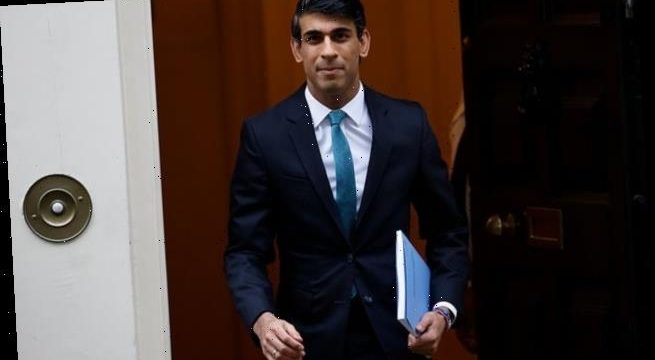Chancellor Rishi Sunak announces public sector pay freeze for next year but NHS workers will be exempt while the lowest paid will also get an increase… while most private sector workers go without a wage hike
Rishi Sunak today announced the Government will freeze public sector pay next year but NHS workers and those in the lowest paid jobs will still get an increase in their wages.
The Chancellor said that while much of the private sector had been hammered during the coronavirus crisis, public sector workers had largely not been affected by job losses.
Mr Sunak said in that ‘difficult context’ he could not justify ‘significant across the board’ pay increases for all public sector workers.
However, he revealed NHS staff will be exempt from the pay freeze while public sector workers on the lowest wages will be guaranteed a pay hike of at least £250 next year.
The Chancellor said this approach will mean that a majority of public sector workers will see their wages increase.
Mr Sunak had promised in the days leading up to the Spending Review that the nation would not see a return to austerity.
But the decision to cap many workers’ pay next year is likely to spark accusations of the Chancellor going back on his word.
Chancellor Rishi Sunak today announced at the Spending Review that public sector workers will see their pay froze next year
Speaking in the House of Commons at lunchtime, Mr Sunak said: ‘Coronavirus has deepened the disparity between public and private sector wages.
‘In the six months to September, private sector wages fell by nearly one per cent compared to last year.
‘Over the same period public sector wages rose by nearly four per cent and unlike workers in the private sector who have lost jobs, been furloughed, seen wages cut and hours reduced, the public sector has not.
‘In such a difficult context for the private sector, especially for those people working in sectors like retail, hospitality and leisure, I cannot justify a significant across the board pay increase for all public sector workers.
‘Instead, we are targeting our resources at those who need it most. To protect public sector jobs at this time of crisis and ensure fairness between the public and private sectors, I am taking three steps today.
‘First, taking account of the pay review bodies’ advice we will provide a pay rise to over a million nurses, doctors and others working in the NHS.
‘Second, to protect jobs pay rises in the rest of the public sector will be paused next year.
‘But third, we will protect those on lower incomes. The 2.1 million public sector workers who earn below the median wage of £24,000 will be guaranteed a payrise of at least £250.
‘What this means is that while the Government is making the difficult decision to control public sector pay, the majority of public sector workers will see their pay increase next year.’
Mr Sunak had paved the way for the freeze on Sunday when he failed to rule it out as he also said it was not the time to impose tax hikes ‘in the fog of enormous economic uncertainty’.
Unions had warned the Chancellor that there would be a chance of industrial action if he went ahead with the move.
Meanwhile, Labour said capping salaries would be an ‘absolute kick in the teeth’ for frontline workers after their efforts during the coronavirus crisis.
Mr Sunak had told Sophy Ridge on Sky News at the weekend: ‘You will not see austerity next week, what you will see is an increase in Government spending, on day-to-day public services, quite a significant one coming on the increase we had last year.’
He added: ‘When we launched the spending review I did say to departments that when we think about public pay settlements I think it would be entirely reasonable to think of those in the context of the wider economic climate.
‘I think it would be fair to also think about what is happening with wages, with jobs, with hours, across the economy, when we think about what the right thing to do in the public sector is.’
Frances O’Grady, the head of the TUC confederation of trade unions, had appealed to a ‘sense of fairness’ in urging ministers not to impose a public sector pay freeze.
‘We saw ministers join millions of us clapping firefighters, refuse collectors, social care workers – I don’t think this would be the time to reward them with a real pay cut,’ she said.
Source: Read Full Article

